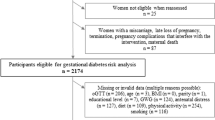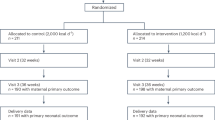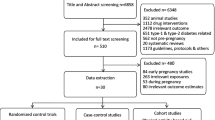Abstract
Objective
To assess the effect of lifestyle counseling on perinatal outcomes among women at high risk for gestational diabetes.
Study design
A total of 492 women with obesity and/or prior gestational diabetes were allocated to intervention (four sessions of lifestyle counseling, n = 249) or usual care (n = 243) before 20 weeks’ gestation.
Result
Lifestyle indicators, gestational weight gain, or obstetric and perinatal outcomes did not differ between the two groups. An oral glucose tolerance test in the first half of pregnancy was pathological in 37.7% (n = 87/144) of intervention and 36.5% (n = 72/197) of control group women (p = 0.81). The total incidence of gestational diabetes diagnosed in the first or second half of pregnancy was 44.8% (107/239) in the intervention and 48.1% (111/231) in the control group (p = 0.48).
Conclusions
The high prevalence of impaired glucose metabolism was observed already in early pregnancy, which may have contributed to the lack of effect of the intervention.
This is a preview of subscription content, access via your institution
Access options
Subscribe to this journal
Receive 12 print issues and online access
$259.00 per year
only $21.58 per issue
Buy this article
- Purchase on SpringerLink
- Instant access to full article PDF
Prices may be subject to local taxes which are calculated during checkout

Similar content being viewed by others
References
Jolly MC, Sebire NJ, Harris JP, Regan L, Robinson S. Risk factors for macrosomia and its clinical consequences: a study of 350,311 pregnancies. Eur J Obstet Gynecol Reprod Biol. 2003;111:9–14.
Farrar D, Simmonds M, Bryant M, Sheldon TA, Tuffnell D, Golder S, et al. Hyperglycaemia and risk of adverse perinatal outcomes: systematic review and meta-analysis. BMJ. 2016;354:i4694.
Zhu Y, Olsen SF, Mendola P, Yeung EH, Vaag A, Bowers K, et al. Growth and obesity through the first 7 y of life in association with levels of maternal glycemia during pregnancy: a prospective cohort study. Am J Clin Nutr. 2016;103:794–800.
Bellamy L, Casas J-P, Hingorani AD, Williams D. Type 2 diabetes mellitus after gestational diabetes: a systematic review and meta-analysis. Lancet. 2009;373:1773–9.
Tam WH, Ma RCW, Ozaki R, Li AM, Chan MHM, Yuen LY, et al. In utero exposure to maternal hyperglycemia increases childhood cardiometabolic risk in offspring. Diabetes Care. 2017;40:679–86.
Quinlivan JA, Lam LT, Fisher J. A randomised trial of a four-step multidisciplinary approach to the antenatal care of obese pregnant women. Aust N Z J Obstet Gynaecol. 2011;51:141–6.
Luoto R, Kinnunen TI, Aittasalo M, Kolu P, Raitanen J, Ojala K, et al. Primary prevention of gestational diabetes mellitus and large-for-gestational-age newborns by lifestyle counseling: a cluster-randomized controlled trial. PLoS Med. 2011;8:e1001036.
Vinter CA, Jensen DM, Ovesen P, Beck-Nielsen H, Jørgensen JS. The LiP (Lifestyle in Pregnancy) study: a randomized controlled trial of lifestyle intervention in 360 obese pregnant women. Diabetes Care. 2011;34:2502–7.
Renault KM, Nørgaard K, Nilas L, Carlsen EM, Cortes D, Pryds O, et al. The Treatment of Obese Pregnant Women (TOP) study: a randomized controlled trial of the effect of physical activity intervention assessed by pedometer with or without dietary intervention in obese pregnant women. Am J Obstet Gynecol. 2014;210:134.e1–9.
Hui AL, Back L, Ludwig S, Gardiner P, Sevenhuysen G, Dean HJ, et al. Effects of lifestyle intervention on dietary intake, physical activity level, and gestational weight gain in pregnant women with different pre-pregnancy Body Mass Index in a randomized control trial. BMC Pregnancy Childbirth. 2014;14:331.
Dodd JM, Turnbull D, McPhee AJ, Deussen AR, Grivell RM, Yelland LN, et al. Antenatal lifestyle advice for women who are overweight or obese: LIMIT randomised trial. BMJ. 2014;348:g1285.
Poston L, Bell R, Croker H, Flynn AC, Godfrey KM, Goff L, et al. Effect of a behavioural intervention in obese pregnant women (the UPBEAT study): a multicentre, randomised controlled trial. Lancet Diabetes Endocrinol. 2015;3:767–77.
Cordero Y, Mottola MF, Vargas J, Blanco M, Barakat R. Exercise is associated with a reduction in gestational diabetes mellitus. Med Sci Sports Exerc. 2015;47:1328–33.
Simmons D, Devlieger R, van Assche A, Jans G, Galjaard S, Corcoy R, et al. Effect of physical activity and/or healthy eating on GDM risk: the DALI lifestyle study. J Clin Endocrinol Metab. 2017;102:903–13.
Barakat R, Pelaez M, Cordero Y, Perales M, Lopez C, Coteron J, et al. Exercise during pregnancy protects against hypertension and macrosomia: randomized clinical trial. Am J Obstet Gynecol. 2016;214:649.e1–8.
Wang C, Wei Y, Zhang X, Zhang Y, Xu Q, Sun Y, et al. A randomized clinical trial of exercise during pregnancy to prevent gestational diabetes mellitus and improve pregnancy outcome in overweight and obese pregnant women. Am J Obstet Gynecol. 2017;216:340–51.
Song C, Li J, Leng J, Ma RC, Yang X. Lifestyle intervention can reduce the risk of gestational diabetes: a meta-analysis of randomized controlled trials. Obes Rev. 2016;17:960–9.
Tuomilehto J, Lindström J, Eriksson JG, Valle TT, Hämäläinen H, Ilanne-Parikka P, et al. Prevention of type 2 diabetes mellitus by changes in lifestyle among subjects with impaired glucose tolerance. N Engl J Med. 2001;344:1343–50.
Knowler WC, Barret-Connor E, Fowler SE, Hamman RF, Lachin JM, Walker EA, et al. Reduction in the incidence of type 2 diabetes with lifestyle intervention or metformin. N Engl J Med. 2002;346:393–403.
Rönö K, Stach-Lempinen B, Klemetti MM, Kaaja RJ, Pöyhönen-Alho M, Eriksson JG, et al. Prevention of gestational diabetes through lifestyle intervention: study design and methods of a Finnish randomized controlled multicenter trial (RADIEL). BMC Pregnancy Childbirth. 2014;14:70.
Koivusalo SB, Rönö K, Klemetti MM, Roine RP, Lindström J, Erkkola M, et al. Gestational diabetes mellitus can be prevented by lifestyle intervention: the Finnish Gestational Diabetes Prevention Study (RADIEL) a randomized controlled trial. Diabetes Care. 2016;39:24–30.
Becker W, Lyhne N, Pedersen A, Aro A, Fogelholm M, Þhórsdottir I, et al. Nordic Nutrition Recommendations 2004 - integrating nutrition and physical activity. Scand J Nutr. 2004;48:178–87.
ACOG Committee on Obstetric Practice. ACOG committee opinion. Exercise during pregnancy and the postpartum period. Number 267, January 2002. American College of Obstetricians and Gynecologists. Int J Gynecol Obstet. 2002;77:79–81.
Working group set up by the Finnish Medical Society Duodecim, the Medical Advisory Board of the Finnish Diabetes Association and the Finnish Gynecological Association. Gestational Diabetes, Current Care Guidelines. www.käypähoito.fi. 2013;1–19.
American Diabetes Association. Standards of medical care in diabetes--2008. Diabetes Care. 2008;31:S12–54.
Meinilä J, Valkama A, Koivusalo SB, Stach-Lempinen B, Lindström J, Kautiainen H, et al. Healthy Food Intake Index (HFII) - Validity and reproducibility in a gestational-diabetes-risk population. BMC Public Health. 2016;16:680.
Ainsworth BE, Haskell WL, Herrmann SD, Meckes N, Basset DR Jr., Tudor-Locke, et al. Compendium of Physical Activities. Med Sci Sports Exerc. 2011;2011:1575–81.
ACOG Committee on Obstetric Practice. Practice bulletin# 33: diagnosis and management of preeclampsia and eclampsia. Obstet Gynecol. 2002;99:159–67.
Pihkala J, Hakala T, Voutilainen P, Raivio K. [Characteristic of recent fetal growth curves in Finland]. Duodecim. 1989;105:1540–6.
Walsh JM, McGowan CA, Mahony R, Foley ME, McAuliffe FM. Low glycaemic index diet in pregnancy to prevent macrosomia (ROLO study): randomised control trial. BMJ. 2012;345:e5605.
Valkama A, Koivusalo SB, Lindström J, Meinilä J, Kautiainen H, Stach-Lempinen B, et al. The effect of dietary counselling on food intakes in pregnant women at risk for gestational diabetes: a secondary analysis of a randomised controlled trial RADIEL. Eur J Clin Nutr. 2015;70:912–7.
Acknowledgements
We acknowledge the contribution of the study nurses Hanna Oksa, Kirsi Arponen, Päivi Saksa, Maaret Ahola, Pirkko Haapanen, Karoliina Himanen, and Eija Kortelainen, dietitians Riitta Kivelä and Johanna Metsälä, as well as the women participating in the study.
Author information
Authors and Affiliations
Contributions
KR and NEG wrote the first draft of the manuscript, participated in the implementation of the study, the statistical analyses, and interpretation of the results. In addition, KR prepared the database for statistical analyses. SBK initiated the RADIEL study and participated in the design, planning, and implementation of the study in collaboration with MMK, BSL, AT, MPA, SA, and HL. EH, RPR, and JGE participated in the implementation of the study. SBK coordinated the study in Helsinki and BSL in Lappeenranta. AV and JM participated in the implementation and statistical analyses and interpretation of the nutritional aspects of the study. HK supervised the statistical analyses and participated in the interpretation of the results. All authors contributed to the revision of the manuscript and approved the final version. KR has had full access to the data in the study and final responsibility for the decision to submit for publication.
Corresponding author
Ethics declarations
Conflict of interest
The authors declare that they have no conflict of interest.
Funding
The RADIEL study is funded by the Jalmari and Rauha Ahokas Foundation, the Finnish Foundation for Cardiovascular Research, State funding for university-level health research of Helsinki University Hospital, and South Karelia Central Hospital, Samfundet Folkhälsan, the Finnish Diabetes Research Foundation, the State Provincial Office of Southern Finland, The Vyborg Tuberculosis Foundation, and the Social Insurance Institution of Finland. In addition, The Finnish Medical Foundation, the Finnish Diabetes Research Foundation, the Finnish Cultural Foundation, the Juho Vainio Foundation, and the Helsinki University Doctoral School in Health Sciences supported the PhD study of the first author. The Academy of Finland supported JGE (grant No. 129369, 129907, 135072, 129255, and 126775). The research leading to these results has received funding from the European Commission within the 7th Framework Program and EU H2020-PHC-2014-DynaHealth grant no. 633595. None of the funding bodies had any role in the design of the study, collection and analysis of data or decision to publish.
Rights and permissions
About this article
Cite this article
Rönö, K., Grotenfelt, N.E., Klemetti, M.M. et al. Effect of a lifestyle intervention during pregnancy—findings from the Finnish gestational diabetes prevention trial (RADIEL). J Perinatol 38, 1157–1164 (2018). https://doi.org/10.1038/s41372-018-0178-8
Received:
Revised:
Accepted:
Published:
Issue Date:
DOI: https://doi.org/10.1038/s41372-018-0178-8
This article is cited by
-
Effective dietary interventions during pregnancy: a systematic review and meta-analysis of behavior change techniques to promote healthy eating
BMC Pregnancy and Childbirth (2025)
-
Preconception lifestyle intervention in women with obesity and echocardiographic indices of cardiovascular health in their children
International Journal of Obesity (2022)
-
Genetic risk of type 2 diabetes modifies the effects of a lifestyle intervention aimed at the prevention of gestational and postpartum diabetes
Diabetologia (2022)
-
Macronutrient intake during pregnancy in women with a history of obesity or gestational diabetes and offspring adiposity at 5 years of age
International Journal of Obesity (2021)
-
Reducing intergenerational obesity and diabetes risk
Diabetologia (2021)



